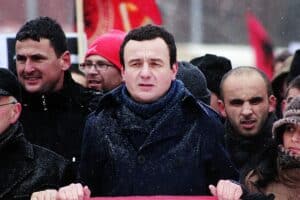(Source: Wikimedia Commons)
Kosovo’s municipal elections of 12 October 2025 took place amid a fragile recovery from nearly eight months of political paralysis. The February parliamentary elections had produced no clear majority, leaving the Assembly unable to function until August, when the election of Vetëvendosje’s Dimal Basha as speaker ended the stalemate. The appointment of a Serb deputy speaker Friday before the local vote completed the institutional framework and restored the legislature’s capacity to operate.
The municipal polls therefore carried significance beyond local governance. They served as the first test of party strength in a post-stalemate environment and as a measure of whether Kosovo’s renewed institutions could regain public confidence after months of drift.
Turnout and Results
Turnout in the first round was 39.47 percent, according to the Central Election Commission (CEC), slightly below the 2021 figure. By the close of polls at 19:00, authorities had recorded around 651,000 ballots.
In Prishtina, turnout was notably higher at 48.1 percent, reflecting both the capital’s political weight and the competitiveness of its mayoral race. Of Kosovo’s 38 municipalities, 21 will proceed to run-offs on 9 November, after no candidate surpassed the necessary 50% threshold in the first round. The result underscores the country’s fragmented local politics and the continued dominance of personal and regional loyalties.
In the capital, incumbent Përparim Rama of the Democratic League of Kosovo (LDK) led with 30,416 votes (28.98 %), closely followed by Hajrulla Çeku of Vetëvendosje (LVV) with 29,559 votes (22.6 %). Neither surpassed 50 percent, sending Prishtina into a decisive second round. For Vetëvendosje, reclaiming the city would signal renewed momentum after a turbulent year in national politics; for the LDK, retaining it would affirm its pragmatic urban appeal.
Nationally, Vetëvendosje won outright in three municipalities, the Democratic League of Kosovo won in two municipalities, the Democratic Party of Kosovo (PDK) one in three municipalities, and the Alliance for the Future of Kosovo (AAK) managed to win in one municipality. In Serb-majority municipalities, the Serb List (Srpska Lista) consolidated its grip, winning outright in nine out of 10 of the northern municipalities, despite lower participation rates. Prior to the election the CEC made a decision to bar Serb List from participating in the elections due to the allegations of links between some of its candidates and Serbia-run “parallel institutions” operating outside central government control in Kosovo, as well as accusations that some candidates are part of organisations considered terrorist by Kosovo authorities. This decision was overturned by the Electoral Complaints and Appeals Panel, allowing Serb List to participate. This return to power follows 4 Serb List mayors resigning due to a dispute with the government in Prishtina, which lead to early elections in 2023, which Serb List boycotted resulting in Albanian mayors being elected despite extremely low turnouts.
Taken together, the results reveal a divided but cautiously stabilising landscape: national parties continue to compete for footholds in major cities, while entrenched power structures, both Albanian and Serb, remain decisive in shaping local outcomes.
Tensions Prior to the Elections
The campaign unfolded against a backdrop of renewed Serb–Kosovo friction. Early in 2025, Prishtina ordered the closure of several Serbian-funded “parallel” institutions in the north, including administrative offices and social-service branches, calling it a reassertion of constitutional order. Belgrade condemned the action, while the EU and U.S. urged restraint and dialogue instead of unilateral measures.
These steps revived long-standing tensions following multiple clashes over the last couple years, including the Banjska attack of 2023 by Serb militants against the Kosovo Police and the 2024 referenda to remove four Albanian mayors in Serb-majority northern municipalities.
Within this tense context, the October elections in Serb-majority areas proceeded under heavy security and muted turnout. The Serb List nevertheless retained control of nearly all northern municipalities, confirming Belgrade’s enduring influence even as civic participation declined. For the government in Prishtina, the results highlighted both the reach and the limits of its authority.
Conclusion
The 2025 local elections mark Kosovo’s cautious re-entry into political normalcy after months of gridlock, yet they also reveal how fragmented the country’s political and social landscape remains. Vetëvendosje’s lead in much of the country shows its capacity to maintain momentum beyond the national stalemate, while the LDK’s diminished reach signals a shift in urban loyalties. In the north, the Serb List’s continued dominance underscores both Belgrade’s influence and the limits of Prishtina’s efforts at integration. With 21 municipalities heading to run-offs in November, including the high-stakes contest in Prishtina, the final outcomes will determine whether the governing party can consolidate local control or whether Kosovo’s divisions will deepen.
Written by Elene Amiranashvili



